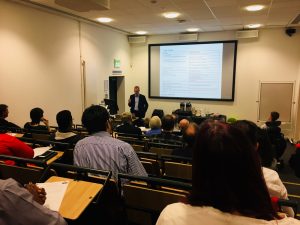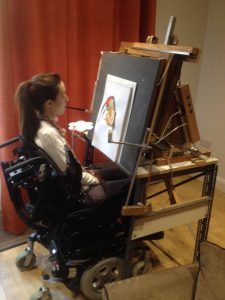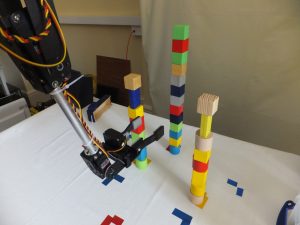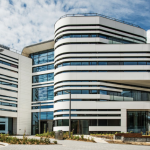On Monday 21st May 2018, Bournemouth University (BU) held the inaugural Assistive Living Technologies (ALT) Symposium at Talbot Campus. The Symposium was a fusion of research domains: Human Computer Interaction, Cyber‐Physical Systems, Robotics, Accessibility, Digital Health and Inclusion. The sponsor of the Symposium was EduWeb (EU Erasmus+ Project) which promotes digital inclusion within educational institutions, by providing a safe and creative web. The Symposium was organised by Dr Paul Whittington and Dr Huseyin Dogan from the Human Computer Interaction (HCI) Research Group.
We were delighted to welcome Professor Nigel Harris from Designability, who develop products to increase dignity, confidence and independence for over 250,000 people with reduced abilities. The charity is supported by the University of Bath and Bath & North East Somerset Health and Wellbeing Board.

We also welcomed Martin Harman and John Heath from Southampton & South West Hampshire Remap Panel and Michael Garnish from Bournemouth Remap Panel. Remap is a national charity operating through local groups of skilled volunteers, who provide independence for people with reduced abilities, by designing and manufacturing bespoke equipment to assist with daily tasks. Designability and Remap delivered presentations on application of assistive living technologies to real world environments.
40 delegates attended the Symposium, representing the BU Faculties of Science & Technology, Health & Social Sciences and Media & Communications, as well as external organisations, including the NHS Dorset Clinical Commission Group, Possum Environmental Controls and Victoria Education Centre.
The Symposium was opened by Dr Paul Whittington and Professor Keith Phalp, followed by an interesting keynote presentation by Professor Nigel Harris, who introduced Designability’s Innovate UK CHIRON Project, which aims to provide a modular robotic system to support care at home. The system (branded JUVA) consists of a set of intelligent robotic systems in locations around the home, to help with personal care, including hygiene tasks and food preparation. The organiser of the Symposium, Dr Paul Whittington, presented his research, centred on the development of a SmartAbility Framework. The framework supports interaction for people with reduced physical ability through the application of built-in sensor technologies that automatically detect user abilities.

The Remap charity presented their work to improve the quality of life for people with disabilities, through the development of bespoke solutions to solve problematic everyday tasks. Examples included assisting with dog walking, playing golf and painting. John Heath (former IBM employee) presented an enlightening video of his Nellie robot, developed to assist people with disabilities to prepare and eat microwave meals. Remap also had a display outside the lecture theatre to promote their work. Professor Hongnian Yu from BU concluded the morning session by providing an insight into the current applications and future trends of robotics in assistive technologies, including prototype versions of robots developed by BU.
Following an opportunity to collaborate and network during the lunch break, the afternoon session began with a presentation from Dr Konstantinos Sirlantzis, Paul Oprea and Laura Day from University of Kent and the Kent, Surrey, Sussex Academic Health Science Network. They introduced their European funded project called ADAPT (Assistive Devices for empowering disAbled People through robotic Technologies), which is run in partnership with institutions in Southern England and Northern France. This included details of driving assistance technologies and a simulator for electrical powered wheelchairs.
The afternoon presentations included two BU Postgraduate Researchers, Mark Mosely and Asha Ward, on their research into an eye gaze controlled robotic arm and the use of music technology to assist users with complex needs respectively. This session provided an opportunity for the sponsors of the Symposium to present their EduWeb research in tackling the problem of digital exclusion, delivered by Zoe Carter (a final year Forensic Computing and Security student). The final presentation of the Symposium described the FACETS (Fatigue: Applying Cognitive behavioural and Engery effectiveness Techniques to lifeStyle) Digital Toolkit, developed by BU, to assist with managing fatigue for people with multiple sclerosis.

The day concluded with a Panel of experts in assistive technology; Professor Nigel Harris, Dr Konstantinos Sirlantzis, Dr Sarah Thomas and Eur Ing Martin Harman. The panel raised some interesting discussions regarding the uses and acceptance of assistive technology, as well as the potential establishment of an Assistive Living Technologies network for Dorset, Hampshire and Wiltshire.
The inaugural Symposium provided an excellent opportunity for the current research into assistive technologies to be presented. The delegates have expressed positive feedback about the Symposium, including; “Congratulations again to you and Huseyin for putting on a first class symposium”, “It gave us the opportunity to speak to various others working in this field”, “I enjoyed the day and met some very interesting people” and “It was great to hear about the wide range of research and positive work taking place.”
We will be organising similar events in the future as we further develop our research into assistive technologies. We would like to thank Professor Keith Phalp, all the presenters and delegates for their support with the Symposium.
The Symposium presentations can be viewed on the HCI Research Group’s website at: http://hci.bournemouth.ac.uk/alt-symposium-2018/
 Assistive Technology Symposium 2019
Assistive Technology Symposium 2019 BBC South filming of Assistive Technology research
BBC South filming of Assistive Technology research










 Fourth INRC Symposium: From Clinical Applications to Neuro-Inspired Computation
Fourth INRC Symposium: From Clinical Applications to Neuro-Inspired Computation Writing policy briefs
Writing policy briefs Upholding Excellence: The Concordat to Support Research Integrity
Upholding Excellence: The Concordat to Support Research Integrity Today’s Documentation Will Serve Tomorrow’s Justice
Today’s Documentation Will Serve Tomorrow’s Justice ECR Funding Open Call: Research Culture & Community Grant – Application Deadline Friday 12 December
ECR Funding Open Call: Research Culture & Community Grant – Application Deadline Friday 12 December MSCA Postdoctoral Fellowships 2025 Call
MSCA Postdoctoral Fellowships 2025 Call ERC Advanced Grant 2025 Webinar
ERC Advanced Grant 2025 Webinar Horizon Europe Work Programme 2025 Published
Horizon Europe Work Programme 2025 Published Horizon Europe 2025 Work Programme pre-Published
Horizon Europe 2025 Work Programme pre-Published Update on UKRO services
Update on UKRO services European research project exploring use of ‘virtual twins’ to better manage metabolic associated fatty liver disease
European research project exploring use of ‘virtual twins’ to better manage metabolic associated fatty liver disease